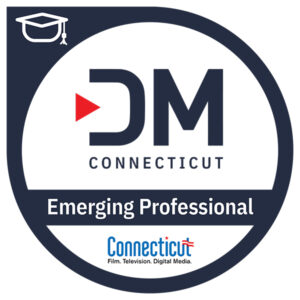“The job market is more demanding as the years go by, what is required of one person used to be a job done by 8 people.”
Episode 2 of Select+CT with Todd Barnes, Sacred Heart University, Wayne Edwards, University of New Haven
We all have the same question – how do we successfully transition from University to Career?
According to some online data I located graduates in nearly every corner of the United States, 53.2 million say they’re unsure of how much value the degree they’ve just earned actually holds. As of February 2021, 14.5 million of those graduates are unable to find a job in their field of study (read more here). Whatever your viewpoint on degrees or whatever path you pursue, many share the same goal – securing an entry-level position that can launch a career.
See also: Careers in Motion GFX
Digital Media CT, and the Select+CT podcast are committed to sharing information that helps students achieve that goal.
In my latest throwback to Select+CT episodes, I had the opportunity to reflect on some of the strategies to support my next steps from college to my career. Of course, the path will change, but having advice from professionals is always helpful as we make adjustments along the way. Episode 2 of Select+CT, features Todd Barnes: Artistic Director at Sacred Heart University, & Wayne Edwards: Lecturer at the University of New Haven. Both educators gave us insight as to how successful graduates like themselves were able to find entry-level work in the place they once studied: college.
Of course, going into education is not the only option and wasn’t the only topic of discussion. So, if you’d like to know how to go from classroom to corporate (or whichever field you’re aiming for), I suggest you keep reading!
Wayne emphasized that the tech industry is changing, and roles and responsibilities are becoming more combined. Students need to have larger skill sets to succeed. You simply can’t focus on just one particular skill, but many, many skills which need to fall under the umbrella of the field you’re studying. “We see that when people graduate from college, there are some jobs and not all the jobs.” Todd added. The job market is more demanding as the years go by; what is required of one person used to be a job done by 8 people.
See also: Woman in Film
This information doesn’t just apply to the digital media industry, it has impacted the entire economy disproportionately in comparison to other sectors. The problem is, that digital media is so demanding now, that the same demand falls onto those seeking digital media-based jobs. Your degree acts as a stepping stone to access the other skills you can possess, but if you don’t do anything to acquire them, you may end up like those 14.5 million graduates who are still searching.
Featured Program
“The advantage of having instructors like Todd and myself is that we’ve been there, we’ve been through tech changes, and understand that the fundamentals of everything is still there,” said Wayne. The University of New Haven, where Wayne instructs, has an office of marketing and communications which aims to promote the university’s reputation through “award-winning strategic and creative efforts”. (You can learn more about that here).
DMCT Micro Credentials

If you are unsure of how your skills connect to Connecticut’s growing Digital Media industry, I encourage you to enroll in DMCT’s first micro-credential course, The Emerging Practitioner. I am a graduate of the program and learned a bunch of things to assist my transition from University to Career in CT and beyond!